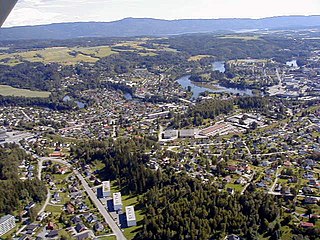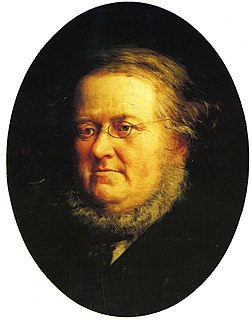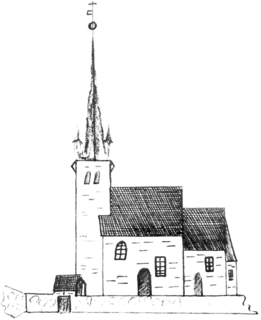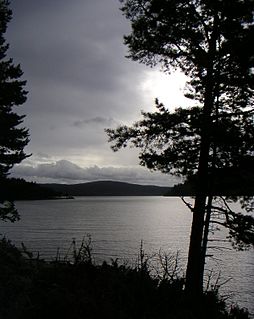
Norderhov is a former municipality located within Ringerike in Buskerud county, Norway. [1]

Norderhov is a former municipality located within Ringerike in Buskerud county, Norway. [1]
Norderhov municipality was established on January 1, 1838 (see formannskapsdistrikt). According to the 1835 census the municipality had a population of 7,234. On 22 April 1852 the city of Hønefoss was separated from Norderhov to constitute a separate administrative unit. In 1857 the rural district Ådal was separated from Norderhov, leaving Norderhov with a population of 6,846. [2]
In 1938 a part of Norderhov with 268 inhabitants was moved to Hønefoss, and on 1 January 1964 the rest was merged with Hønefoss, Ådal, Tyristrand and Hole to form the new municipality Ringerike. Norderhov was by far the largest municipality prior to the merger, with a population of 15,143. [3]
The municipality (originally the parish) was named after the old farm Norderhov (Old Norse: Njardarhof), since the first church was built there. The first element is the genitive case of the name Njord, the last element is hof , Old Norse for 'temple'. Until 1865 the name was written Norderhoug. The parish of Norderhov (Norderhov prestegjeld) included churches located at Norderhov, Haug, Lunder, Tyristrand, Ådal, Veme and Hønefoss.

Ringerikes museum was founded in 1923. It is the regional museum for the municipalities of Hole and Ringerike in Buskerud county. Ringerikes Museum is located at the site of the former rectory of Norderhov Church which it moved into around 1960. Stiftelsen Ringerikes Museum owns and Stiftelsen Hringariki operates the museum. [4] [5]
The museum is noted for its collection of icons and runestones, as well as for its memorabilia relating to authors Peter Christen Asbjørnsen and Jørgen Moe. The Icon Collection at the museum was donated by the artist Hans Ødegaard. The collection contains icons from the Baltics, Greece and Russia, the oldest dating back to the 1400s. Hjemmestyrkemuseet, located on the first floor of Ringerike museum, shows weapons and equipment from the German occupation of Norway. [6] [7]

Norderhov church (Norderhov kirke) is a medieval church which has been rebuilt and expanded into a cruciform church. It is located in Norderhov just south of Hønefoss. The church was originally built as a church of stone approx. 1170. The construction may be related to the establishment of the Diocese of Hamar in 1153. Norderhov Church has a recorded history dating to an announcement for Ringerike issued in 1298 by Duke Hakon Magnusson, who later became King Haakon V. The church is most known for it close connection with Anna Colbjørnsdatter and with the Skirmish at Norderhov.[ citation needed ]
The church was renovated in 1771, 1796 and 1809–1810. The sacristy was extended to the east and with new, larger windows and a new lower ceiling and a new choir loft in 1881–1882. Meanwhile, the tower spire was covered with copper plates and the church was refurbished. A new chapel was erected on the north side of the church in 1910–1912. The church was restored again in 1926 and 1953–1956. [8]
Norderhov church was the site of the Skirmish at Norderhov (Slaget på Norderhov). Late on the evening of 28 March 1716, an army of King Charles XII of Sweden was confronted by Norwegian forces. The Swedish troops had taken shelter in and by the old Norderhov rectory. Anna Colbjørnsdatter, the spouse of pastor Jonas Danilssønn Ramus, sent an alert to Norwegians forces about the presence of the Swedes. The event itself was published by Peter Andreas Munch in his book Norges, Sveriges og Danmarks Historie til Skolebrug (1838). [9] [10]

Sokna is a small village located between Hønefoss and Krøderen in the municipality of Ringerike, in the county of Buskerud, Norway. Its population is 543.

Buskerud is a former county and a current electoral district in Norway, bordering Akershus, Oslo, Oppland, Sogn og Fjordane, Hordaland, Telemark and Vestfold. The region extends from the Oslofjord and Drammensfjorden in the southeast to Hardangervidda mountain range in the northwest. The county administration was in modern times located in Drammen. Buskerud was merged with Akershus and Østfold into the newly created Viken County on 1 January 2020. On the 23 February 2022 Viken County Council voted in a 49 against 38 decision to submit an application to the Norwegian government for a county demerger.

Ringerike is a municipality in the traditional and electoral district Buskerud in Viken county, Norway. It is part of the traditional region of Ringerike. The administrative centre of the municipality is the town of Hønefoss.

Hole is a municipality in Viken county, Norway. It is part of the traditional region of Ringerike. The administrative centre of the municipality is the village of Vik. Hole is located around lake Tyrifjorden and extends to the woodland around Oslo. The soil is fertile and suited to growing fruit, berries and other agricultural products.

Gol (help·info) is a municipality in Buskerud in Viken county, Norway. It is part of the traditional region of Hallingdal. The administrative center of the municipality is the village of Gol which is also the population center. Gol was established as a municipality on 1 January 1838. The area of Hemsedal was separated from Gol in 1897 to become a separate municipality. The municipality of Gol is bordered to the north by the municipality of Nord-Aurdal, to the east by Sør-Aurdal, to the south by Nes, and to the west by Ål and Hemsedal.

Krødsherad is a municipality in Viken county, Norway. The administrative centre of the municipality is the village of Noresund. The municipality of Krødsherad was established when it was separated from the municipality of Sigdal on 1 January 1901.

Modum is a municipality in Buskerud in Viken county, Norway. The administrative centre of the municipality is the town of Vikersund. The municipality of Modum was established on 1 January 1838.

Hønefoss is a town and the administrative center of the municipality of Ringerike in Buskerud county, Norway. Hønefoss is an industrial center of inner Østlandet, containing several factories and other industry. As of 1 January 2008, Hønefoss has 14,177 inhabitants. In 1852, Hønefoss received town status and was separated from Norderhov. In 1964, Hønefoss ceased being a separate municipality and became part of Ringerike.

Jørgen Engebretsen Moe was a Norwegian folklorist, bishop, poet, and author. He is best known for the Norske Folkeeventyr, a collection of Norwegian folk tales which he edited in collaboration with Peter Christen Asbjørnsen. He also served as the Bishop of the Diocese of Kristianssand from 1874 until his death in 1882.

Peter Christen Asbjørnsen was a Norwegian writer and scholar. He and Jørgen Engebretsen Moe were collectors of Norwegian folklore. They were so closely united in their lives' work that their folk tale collections are commonly mentioned only as "Asbjørnsen and Moe".

Jonas Danilssønn Ramus was a Norwegian priest, author and historian. He is principally known as an author of religious and historical writings.

Uvdal is a village and former municipality in Buskerud county, Norway. It is situated in the traditional region of Numedal and is the location of the Uvdal Stave Church.

Hallingby is a village in Ringerike municipality in the county of Buskerud, Norway.

Tyristrand is a village in Ringerike municipality in Buskerud county, Norway.

Hen is a small village in the municipality of Ringerike in Buskerud, Norway.

Ådal is a valley in the municipality of Ringerike and was a former municipality in Buskerud County, Norway.

Haugsbygd is a village in Ringerike municipality, northeast of the center of Hønefoss, in Buskerud, Norway.

Follum is a village in Ringerike municipality, Viken County, Norway.

Anna Colbjørnsdatter Arneberg (1667–1736) was a Norwegian national heroine who was most known for her participation in the Battle of Norderhov during the Great Northern War.